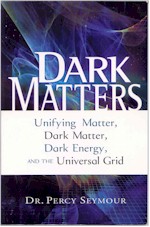 |
|
|
| ||||||
|
|
This page is the original source of this review, though you may also find it on Amazon or other sites. | ||
| Book Reviews Home | Free Audio Books | |
 |
Book Review of: Dark MattersUnifying Matter, Dark Matter, Dark Energy, and the Universal Grid Price:
$16.99 Availability: Usually ships
within 24 hours |
| Review
of
Dark Matters, by Author (Softcover, 2008) (You can print this review in landscape mode, if you want a hardcopy) Reviewer: Mark Lamendola, author of over 6,000 articles. This book would be good for someone needing an introduction to, and overview of, physics, astrophysics, and cosmology. The bulk of the text covers those three disciplines. I don't know why the book has this particular title, because the author barely addresses the subject of dark matter. I'll address the positives and shortcomings of this book, briefly.
Positives
Shortcomings
I think this book would make a good adjunct text for a high school physics class or a college 101 physics class. I say that because it provides a good overview without delving so deeply into the subjects that it loses the reader. Yes, it does have errors. But there's a correlation between the errors and the quality of the explanations. A student who comes across an error is unlikely to understand the stumbling explanation, thus rendering the error largely moot. This book consists of an introduction and eight chapters in 206 pages, a bibliography, and an index. The chapters are organized into two Parts. Part One consists of four chapters, each dealing with a separate aspect of magnetism. In Part Two, the chapter titles are Evidence for the Unseen, Relativity and Quantum Theory, Theories on the Nature of Matter, and Modeling Reality. | |
About these reviewsYou may be wondering why the reviews here are any different from the hundreds of "reviews" posted online. Notice the quotation marks? I've been reviewing books for sites like Amazon for many years now, and it dismays me that Amazon found it necessary to post a minimum word count for reviews. It further dismays me that it's only 20 words. If that's all you have to say about a book, why bother? And why waste everyone else's time with such drivel? As a reader of such reviews, I feel like I am being told that I do not matter. The flippancy of people who write these terse "reviews" is insulting to the authors also, I would suspect. This sound bite blathering taking the place of any actual communication is increasingly a problem in our mindless, blog-posting Webosphere. Sadly, Google rewards such pointlessness as "content" so we just get more if this inanity. My reviews, contrary to current (non) standards, actually tell you about the book. I always got an "A" on a book review I did as a kid (that's how I remember it anyhow, and it's my story so I'm sticking to it). A book review contains certain elements and has a logical structure. It informs the reader about the book. A book review may also tell the reader whether the reviewer liked it, but revealing a reviewer's personal taste is not necessary for an informative book review. About your reviewer
About reading styleNo, I do not "speed read" through these. That said, I do read at a fast rate. But, in contrast to speed reading, I read everything when I read a book for review. Speed reading is a specialized type of reading that requires skipping text as you go. Using this technique, I've been able to consistently "max out" a speed reading machine at 2080 words per minute with 80% comprehension. This method is great if you are out to show how fast you can read. But I didn't use it in graduate school and I don't use it now. I think it takes the joy out of reading, and that pleasure is a big part of why I read. |
| |||||